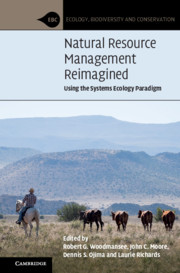Book contents
- Natural Resource Management Reimagined
- Ecology, Biodiversity and Conservation
- Natural Resource Management Reimagined
- Copyright page
- Contents
- Contributors
- Preface
- 1 The Systems Ecology Paradigm
- 2 Environmental and Natural Resource Challenges in the Twenty-First Century
- 3 Evolution of Ecosystem Science to Advance Science and Society in the Twenty-First Century
- 4 Five Decades of Modeling Supporting the Systems Ecology Paradigm
- 5 Advances in Technology Supporting the Systems Ecology Paradigm
- 6 Emergence of Cross-Scale Structural and Functional Processes in Ecosystem Science
- 7 Evolution of the Systems Ecology Paradigm in Managing Ecosystems
- 8 Land/Atmosphere/Water Interactions
- 9 Humans in Ecosystems
- 10 A Systems Ecology Approach for Community-Based Decision Making
- 11 Environmental Literacy
- 12 Organizational and Administrative Challenges and Innovations
- 13 Where to From Here? Unraveling Wicked Problems
- Index
- References
7 - Evolution of the Systems Ecology Paradigm in Managing Ecosystems
Published online by Cambridge University Press: 25 February 2021
- Natural Resource Management Reimagined
- Ecology, Biodiversity and Conservation
- Natural Resource Management Reimagined
- Copyright page
- Contents
- Contributors
- Preface
- 1 The Systems Ecology Paradigm
- 2 Environmental and Natural Resource Challenges in the Twenty-First Century
- 3 Evolution of Ecosystem Science to Advance Science and Society in the Twenty-First Century
- 4 Five Decades of Modeling Supporting the Systems Ecology Paradigm
- 5 Advances in Technology Supporting the Systems Ecology Paradigm
- 6 Emergence of Cross-Scale Structural and Functional Processes in Ecosystem Science
- 7 Evolution of the Systems Ecology Paradigm in Managing Ecosystems
- 8 Land/Atmosphere/Water Interactions
- 9 Humans in Ecosystems
- 10 A Systems Ecology Approach for Community-Based Decision Making
- 11 Environmental Literacy
- 12 Organizational and Administrative Challenges and Innovations
- 13 Where to From Here? Unraveling Wicked Problems
- Index
- References
Summary
The systems ecology paradigm (SEP) emerged in the late 1960s at a time when societies throughout the world were beginning to recognize that our environment and natural resources were being threatened by their activities. Management practices in rangelands, forests, agricultural lands, wetlands, and waterways were inadequate to meet the challenges of deteriorating environments, many of which were caused by the practices themselves. Scientists recognized an immediate need was developing a knowledge base about how ecosystems function. That effort took nearly two decades (1980s) and concluded with the acceptance that humans were components of ecosystems, not just controllers and manipulators of lands and waters. While ecosystem science was being developed, management options based on ecosystem science were shifting dramatically toward practices supporting sustainability, resilience, ecosystem services, biodiversity, and local to global interconnections of ecosystems. Emerging from the new knowledge about how ecosystems function and the application of the systems ecology approach was the collaboration of scientists, managers, decision-makers, and stakeholders locally and globally. Today’s concepts of ecosystem management and related ideas, such as sustainable agriculture, ecosystem health and restoration, consequences of and adaptation to climate change, and many other important local to global challenges are a direct result of the SEP.
Keywords
- Type
- Chapter
- Information
- Natural Resource Management ReimaginedUsing the Systems Ecology Paradigm, pp. 202 - 244Publisher: Cambridge University PressPrint publication year: 2021
References
- 1
- Cited by

